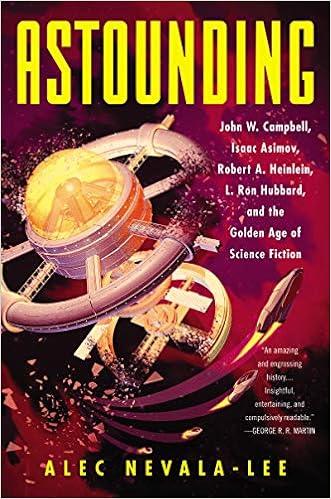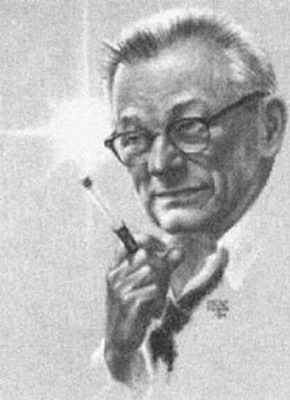For about twenty years, Astounding was the leading magazine in the SF field. Under the editorship of John W. Campbell, Jr. it published stories by Robert A. Heinlein, Arthur C. Clarke, L. Ron Hubbard, Isaac Asimov, and A. E. Van Vogt, in an era that became known as the golden age of science fiction.
Astounding: John W. Campbell, Isaac Asimov, Robert A Heinlein, L. Ron Hubbard, and the Golden Age of Science Fiction by Alec Nevala-Lee is the history of that period and a biography of Campbell and his three major authors.
Although there have been biographies and critical studies of the authors before this, it's the first major biography of Campbell, who was arguably the most influential editor in the history of science fiction.
As an editor, he wanted good writing, accurate science, believable characters, and stories that logically accounted for multiple variables: "The future doesn't happen one at a time."Campbell was controversial. His political views put him well to the right of the political spectrum, something that probably didn't help his career during the 1950s and 60s when SF made a distinct swing to the left. He was also seriously into what we'd now call fringe ideas and championed dianetics with L. Ron Hubbard, ESP and parapsychology, and the Dean drive (a purported reactionless drive that didn't work).
I am well read in both science fiction and historical and critical work aobut it, and there were things in this book that I had never heard about, for example, Campbell's correspondence with Gene Roddenberry and his influence on the original Star Trek series.
The book isn't just about Campbell; as the subtitle indicates it's also about Heinlein, Asimov, and Hubbard, and especially about Campbell's influence on their careers, which was extensive. Unfortunately, it's clear that while Campbell was instrumental in developing their careers, he couldn't grow with them and maintain the relationship that he'd established.
I would have liked to see more details on the history and operation of the magazine itself and the role of the magazines in fostering the development of the genre. It's there, but I wanted more. Still, I enjoyed this book immensely, and I recommend it highly if you have any interest in classic science ficiton.



No comments:
Post a Comment